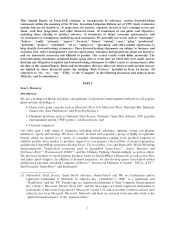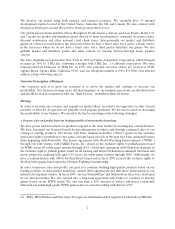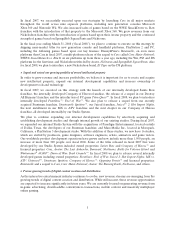THQ 2007 Annual Report Download - page 18
Download and view the complete annual report
Please find page 18 of the 2007 THQ annual report below. You can navigate through the pages in the report by either clicking on the pages listed below, or by using the keyword search tool below to find specific information within the annual report.
10
Item 1A. Risk Factors
Our business is subject to many risks anduncertainties which mayaffect our future financial performance.
Some of those important risks and uncertainties which may cause ouroperating results to varyor which
may materially and adversely affect ouroperating resultsareas follows:
Risk factors related to console hardware
Our business depends on hardware on which consumers play our games. In the past 18 months, Microsoft,
Nintendo andSony each released anew console platform, theXbox 360, Wii and PlayStation 3 (“PS3”),
respectively. These platforms are called“newgeneration” consoles and succeed the Xbox, GameCube and
PlayStation 2(“PS2”),respectively, which we refer to hereinasthe “legacy platforms”. The new generation
consoles can adversely affect sales of our video games andour profitability as follows:
Hardware shortages. Each of the new generation consoles hasexperiencedhardware shortages, which
continue for some of the most recently released platforms. Hardware shortages generallynegativelyaffect
the sales of video games since consumers do not have consoles on which to play thegames.
Hardware pricing.The newgeneration consoles arepriced higher than each of thepredecessor platforms.
TheXbox 360can cost as much as $479.99, theWii is priced at $249.99 and thePS3 can cost as much as
$599.99. The cost of thehardware could adversely affect theirsales, which could negatively affect sales of
our products forthese platforms since consumers need a platform in order to play our games.
Software pricing. Softwareprices for the new generation console games arehigher than prices for games
for the predecessor platforms. Thereis no assurance that consumers will continueto pay thehigher prices
of these games.
Additionally, althoughwe still publish gamesfor thePS2,asconsumers purchase gamesfor new generation
consoles rather than for the PS2 and demand for games on thePS2declines, the pricesof our games for
the PS2 mayalso decline. Reduced pricing of our PS2products may result in lower revenues, which could
materially affect ourprofitability.
Increasing development costs. The introduction of the new generation platforms has requiredthe
developmentofnewsoftware to play on such consoles andnewtechnologies to create such software.
Because the new generation consoles have greater complexity andcapabilities than thepredecessor
platforms, costs arehigherto develop games for new generation consoles.Greater costscan lead to lower
operating margins,negatively affecting our profitability.
We must continue to develop and sell new titles in order to remain profitable.
Our profitability hasdirectly resulted from our ability to develop andsell successful new titles for use on
multiple platforms. Consumer preferences for games are difficult to predict, and even the most successful
titles remain popular for only limited periodsof time,often less thansixmonths.
Competitive launches maynegatively affect the sales of our games.
We compete for consumer dollars with several other video game publishers andconsumers must make
choices among available games. If we make our games available forsale at thesame time as many other
newgames become available, consumers may choose to spend their money on products published by our
competitorsratherthan our products andretailersmaychoosetogive more shelfspacetoourcompetitors’
products, leavingless space to sell ourproducts. Since, as described above, the life cycle of agameis short,
strongsales of our competitors’ games could negatively affect thesales of ourgames.
























